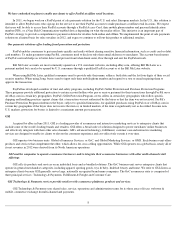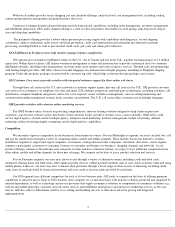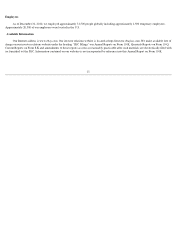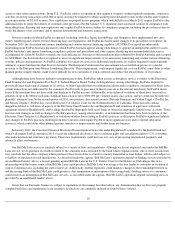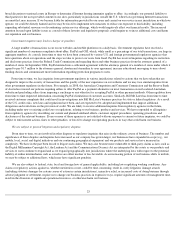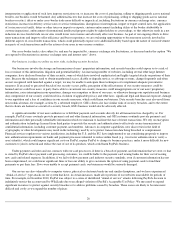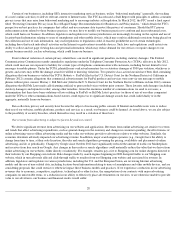eBay 2012 Annual Report Download - page 20
Download and view the complete annual report
Please find page 20 of the 2012 eBay annual report below. You can navigate through the pages in the report by either clicking on the pages listed below, or by using the keyword search tool below to find specific information within the annual report.
assets or other enforcement actions. In the U.S., PayPal is subject to regulations that require it to report, within required timeframes, suspicious
activities involving transactions of $2,000 or more, and may be required to obtain and keep more detailed records on the senders and recipients
in certain transfers of $3,000 or more. New regulations on prepaid access programs which took full effect in March 2012 require PayPal to take
additional steps to verify the identity of customers who pre-fund a PayPal balance. U.S. regulators have increased scrutiny of compliance with
these obligations. Existing and new regulations may require PayPal to revise further its compliance program, including the procedures it uses to
verify the identity of its customers and to monitor international and domestic transactions.
Several countries in which PayPal is regulated, including Australia, Japan, Luxembourg, and Singapore, have implemented new anti-
money laundering and counter-terrorist financing laws and regulations, and PayPal has had to make changes to its procedures in response. In
November 2009, the Australian anti
-money laundering and counter-terrorist financing regulator (AUSTRAC) accepted an enforceable
undertaking from PayPal Australia pursuant to which PayPal Australia agreed, among other things, to appoint an independent auditor to assess
PayPal Australia's anti-money laundering compliance policies and procedures and issue a report identifying any unremediated deficiencies
accompanied by a plan by PayPal to remedy any such deficiencies. Pursuant to the remediation plan submitted by PayPal Australia and accepted
by AUSTRAC, PayPal Australia was required to invest in significant improvements to its anti-money laundering and counter-terrorist financing
systems, policies and operations. As PayPal continues to localize its services in additional jurisdictions, it could be required to meet standards
similar to or more burdensome than those in Australia. The European Commission has also announced a consultation process to consider
revisions to the European Anti-Money Laundering Directive. These requirements could impose significant costs on PayPal, cause delay to other
planned product improvements, make it more difficult for new customers to join its network and reduce the attractiveness of its products.
Although there have been no definitive interpretations to date, PayPal has taken actions as though its service is subject to the Electronic
Fund Transfer Act and Regulation E of the U.S. Federal Reserve Board. Under such regulations, among other things, PayPal is required to
provide advance disclosure of changes to its service, to follow specified error resolution procedures and to reimburse consumers for losses from
certain transactions not authorized by the consumer. PayPal seeks to pass most of these losses on to the relevant merchants, but PayPal incurs
losses if the merchant does not have sufficient funds in its PayPal account. Additionally, even technical violations of these laws can result in
penalties of up to $1,000 for each non-compliant transaction or up to $500,000 per violation in any class action, and we could also be liable for
plaintiffs' attorneys' fees. In the second quarter of 2010, two putative class-action lawsuits (Devinda Fernando and Vadim Tsigel v. PayPal, Inc.
and Moises Zepeda v. PayPal, Inc.) were filed in the U.S. District Court for the Northern District of California. These lawsuits contain
allegations related to violations of aspects of the Electronic Fund Transfer Act and Regulation E and violations of a previous settlement
agreement related to Regulation E, and/or allege that PayPal improperly held users' funds or otherwise improperly limited users' accounts. These
lawsuits seek damages as well as changes to PayPal's practices, among other remedies. A determination that there have been violations of the
Electronic Fund Transfer Act, Regulation E or violations of other laws relating to PayPal's practices could expose PayPal to significant liability.
Any changes to PayPal's practices resulting from these lawsuits could require PayPal to incur significant costs and to expend substantial
resources, which could delay other planned product launches or improvements and further harm our business.
In January 2012, the Consumer Financial Protection Bureau finalized new rules under Regulation E, mandated by the Dodd-Frank Act,
which will require PayPal, starting in 2013, to provide additional disclosures, error resolution rights and cancellation rights to U.S. consumers
who make international remittance payments. These new requirements could increase our costs of processing international payments and
adversely affect our business.
Our Bill Me Later service is similarly subject to a variety of laws and regulations. Although we do not originate loans under the Bill Me
Later service, we do purchase receivables related to the consumer loans extended by the bank which originates them. One or more jurisdictions
may conclude that the eBay company which purchases those receivables is a lender or money transmitter or loan broker, which could subject us
to liability or regulation in such jurisdictions. As described under the caption “
Bill Me Later's operations depend on lending services provided by
an unaffiliated lender” above, a lawsuit pending against Bill Me Later in the U.S. District Court for the District of Utah alleges that in its
relationship with the former issuer of the Bill Me Later credit products, Bill Me Later was acting as the true lender to customers in violation of
various California laws, including the state's usury law. Additionally, federal regulators could mandate changes to the relationship between us
and the issuing bank of the Bill Me Later credit products. Any termination or interruption of the issuing bank's lending services to consumers
could result in an interruption of Bill Me Later services, as described under the caption “Bill Me Later's operations depend on lending services
provided by an unaffiliated lender” above.
Given that our Payments business is subject to regulations in the manner described above, any determination that we have not properly
complied with laws and regulations or any instances in which we are criminally indicted or found to have violated
18


